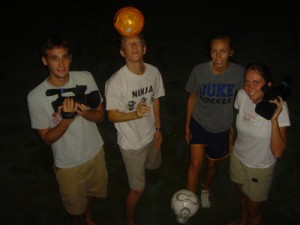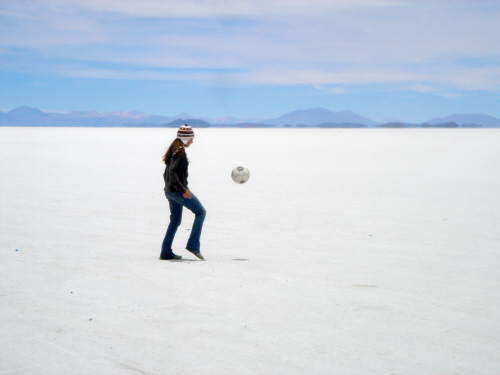Ahead of Sunday’s Philadelphia screening of the documentary, Pelada, we talked with Gwendolyn Oxenham who, along with co-star Luke Boughen, toured the world with one simple goal: get into pickup soccer games and see what happens. The result, filmed by Rebekah Fergusson and Ryan White, renders distance irresolute, while laying bear our common humanity.
PSP: What type of soccer background do you and Luke bring to the documentary?
It’s people’s happiness… No matter what you do for work…you can puts on your cleats, kick the ball around… meet new people.
GWEN: We’ve both played division 1 collegiate—myself at Duke, while Luke played at Notre Dame. I played for the woman’s side of Santos, a team in Brazil, while I was down there for two months prior to starting graduate school. Rebeka and Ryan studied with me at Duke’s Center For Documentary Centers. She was on my collegiate team—she played outside back and I played outside mid. I met Luke at a pickup game in South Bend while he was finishing up undergrad.
PSP: What was the impetus for making the documentary?
Gwen: We all grew up playing pickup. It’s people’s happiness. It’s where I’ve always had the most fun playing soccer. No matter what you do for work, at the end of the day you can puts on your cleats, kick the ball around, have fun, and meet new people. We’re hoping that the very same people who play in pickup games across the country, around the world, will check out the film.
Here were all these guys with big guns and machetes, and next thing you know they’re laying all that hardware down and just like kids we’re kicking the ball about.
PSP: For people who are soccer mad, it’s amazing to latch onto that feeling while abroad, to stumble upon the game while walking across say, Hyde Park or Munich’s Englischer Garten. Was there a moment in your previous travels that led to the idea for the film?
GWEN: Yeah. I was working as a deckhand off Mexico and one day we stopped at an island off Ascension Bay that was heavily guarded, but had, amidst the arid soil past the rocks of the shoreline, a makeshift soccer field.
Here were all these guys with big guns and machetes, and next thing you know they’re laying all that hardware down and just like kids we’re kicking the ball about. Sure, there were armed soldiers around the field, but that was quickly out of our minds—the focus was on the soccer. It was at that moment that I stopped being an American tourist and they stopped being soldiers. It was a great way to interact with people in a different way in an unusual setting.

PSP: You visit 25 countries for the documentary—your adventure I should say. What kind of funding did you receive to make this project a reality?
He [a government agent] quickly professed his infatuation with Kaka, and then let us know how we could go about our filming without running into trouble.
GWEN: We received a $5,000 grant from the Duke Arts Initiative, whose only reservation during the application process was that we not state this as an “around the world project” since they said it could make it sound like we were trying to tackle too much. In addition to that, we also solicited charitable donations.
PSP: What games or interactions stand out the most?
GWEN: Our matches with moonshine brewers from Kenya’s Mathare Valley is up there at the top. They brew moonshine in the rivers running through the slums. We played in a five team tournament with them that was pretty intense because no one could afford to lose the 20 cents per player entry fee that was at stake.
In Bolivia we bribed officials to get into a prison for what we heard was the best game around.
In Iran I was reported to the government. I don’t know why. Maybe it was because I was a woman playing with men—which is, of course, not allowed—or because we were [laughs] American tourists with video cameras.
The interesting thing is what ensued—the government agent’s face lit up once he realized what we were doing. He quickly professed his infatuation with Kaka, and then let us know how we could go about our filming without running into trouble.
We played in Tel Aviv the day after a terrorist attack. Though the Palestinians and Jews refused to play with each other, it was still a soccer game juxtaposed against a bloody attack. There ended up being tension, a [minor] fight over a goal, but we had that fight everywhere.
In Bolivia we bribed officials to get into a prison for what we heard was the best game around. In the 80’s people had done the same to get in and buy drugs.
PSP: So they were probably a bit shocked that you weren’t there for the coca?
GWEN: [Laughs] Yeah, I don’t think anyone’s been there before for pickup.
PSP: Any place else you’d like to highlight?
GWEN: In Brazil we played with these really old guys who drew up their rosters on a Playboy and then kicked the hell out of each other barefoot—it’s a scene that’s always a favorite.
PSP: The situation in Iran calls to mind the all girl pickup games in Palestine that’s featured in the film’s trailer. Did the guys in the Iranian game take exception to you playing at first?
GWEN: They were reluctant but they let me play. Everything was fine after a few minutes. It was one of our games in Regent’s Park in London, actually—a game with Arab immigrants—where I wasn’t allowed to play due to religious issues about being in close proximity with a female.
PSP: I’m sure, given the nature of pickup games, it was simple enough, but can you describe the usual approach prior to getting into games?
After the games we were always invited to someone’s house …There was always a drink after the game.
GWEN: Luke’s pretty good with languages. He would listen to a podcast and learn to say “I want to play” at least prior to approaching someone. Or we’d just take out a ball, kick it around, and gesture and that would work. Any unease evaporated once people saw that we could play, that we loved the same game they loved.
Everyone was really nice everywhere. The ghetto in Argentina was probably the most dangerous place but again, they warmed up to us quickly and we soon had a whole gang of people protecting us.
PSP: The match footage is full of dazzling talent. How was the soccer?
GWEN: The level of skill was amazing—everyone shared the desire to be great, to do something beautiful on the pitch no matter what their story was. And you feel guilty complaining about being tired or ever being lazy about making a game back home when, as with the Mathare Valley moonshine brewers, you’re playing with guys who are full of energy after working a 4am to 5pm shift of heavy labor.
PSP: How did the welcoming atmosphere of the games spill over post-match?
GWEN: After the games we were always invited to someone’s house so someone’s mom could cook for us. An Algerian guy in Marseilles invited us over for his mothers home cooking. In Iran we had tea with firemen after our match; in Japan saki with businessmen; in Brazil we drank with the old guys I mentioned. There was always a drink after the game.
PSP: It’s all about that odd intersection of lives that the game tells us isn’t that odd after all.
GWEN: Yeah, definitely. We played a game with African Immigrants in Regent’s Park, London. They mentioned that Woody Harrelson would come out to the pickup and play with them quite often while he was in town shooting a movie. One guy was a bit upset over losing his contact info, saying, “aw man, I don’t have my friend Woody’s email anymore.”
PSP: In terms of gritty reality, what experience affected you the most?
GWEN: Kenya is the place that affected us the most—our game in the slums. Coming back from a practice in the pouring rain there were open trenches of sewage running down to the river. The streets were mud caked, with soggy newspapers strewn about. The smell was atrocious. I was falling in sewage every step of the way. It makes you realize…I wanted to be on the National team and that was a big thing for me. But seeing the varying circumstances and the hardships people face, while seeing how soccer has a much greater impact in their lives, how it helps inform their optimism, their joy, it definitely makes you look at the game and life in a different perspective. We didn’t set out to say soccer can change everything, but we saw that it certainly can do a lot.
PSP: How are you maintaining some of the contact you’ve made?
GWEN: We’re having a few international screenings where we’ll get to revisit some of the friends we’ve made. We’re really looking forward to heading back to Kenya in two weeks for a screening in the slums.
Screening is 7pm Sunday September 19th at The Ibrahim Theater At UPenn’s International House, 3701 Chestnut St., 215-387-5125.
Director Ryan White will be on hand for a Q and A session.


Sweet interview. I hope to catch the film on Sunday if back from a game in DC, it sounds like it will be worth it.